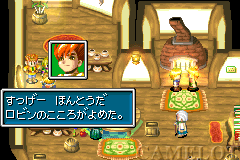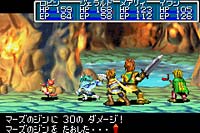 | Golden Sun - Review |  |
Of Elemental Magic And Jellybeans By: Zachary Lewis
| Review Breakdown |
| Battle System |
6 |
| Interface |
3 |
| Music/Sound |
9 |
| Originality |
3 |
| Plot |
6 |
| Localization |
6 |
| Replay Value |
5 |
| Visuals |
9 |
| Difficulty |
Easy |
| Time to Complete |
20-35 hours | | | Overall |  |
| Criteria |
From the developers of Shining Force comes the Game Boy Advance's first 'old school' RPG; fantasy, sorcery, and a feeling that draws one back to their childhood. But, can such time-worn concepts as saving the world from the dread forces of magic replay themselves in today's gaming industry with the success of yester-year? If all the future titles follow the path laid out by Golden Sun, the answer might well be 'yes'.
The battle engine, which features the best graphics in the game, is fairly dynamic as far as turn-based combat goes. Each turn, you select character actions from a panel of rather descriptive icons. After your selections are complete, the battle turn takes place. During the turn, each character and creature does their action in an order based on their agility. Fighting major boss creatures or even large numbers of smaller beasts requires a fair amount of strategy and planning, as you cannot change your actions once you have selected them for your entire party. Yet another twist on the system is the advent of 'area effect magic'. Many spells target 3 opponents rather than one. The trick to effective use of spells in Golden Sun is to place spells so that they will damage the most foes that are weak against that particular element. The strength and growth of each character is affected by the number of small elementals - Djinn - that you befriend on your quest. By setting them to either 'set' or 'standby' modes, you can enhance character stats and summon powerful creatures.
 | | When Garet Speaks, People Listen | |
As the earlier reference to graphics implies, the greatest area of graphical power is shown in the battle system. The visuals in the game are quite remarkable even as a whole. Areas have widely varied graphical styles ranging from lushly colored autumn forest settings to mysterious crystalline caverns that shine near light sources. And, to further augment the sensory beauty of the game, comes a soundtrack composed by Motoi Sakuraba. The majority of the tracks are very pleasant to listen to, and should never have you muting the volume simply to listen to something else. On the otherhand, many of the games' sound effects are very nerve wracking. Thankfully, Camelot must've discovered this fact, because in the setup menu, you have the option to turn that particular sound off.
Unfortunately, you might find using the setup menu to be quite the ordeal. For some reason, the same button used to talk to people, search for items, and activate objects, just happens to be the same one used to open the menu. This can get rather frustrating when you're intensively searching an area full of ceramic pots for items, because the activation areas for those types of things tend to be rather small. Both of these factors can lead to you accidentally opening the menu and needing to cancel out of it many times. Beyond this drawback comes the even worse design of the icons used to represent things in the interface system. In a completely different realm than the obvious battle system buttons, the setup menu has highly vague, and often misleading icons.
Although Golden Sun might not seem particularly hefty and huge as far as RPGs go, a good thing to keep in mind is that it was developed for a handheld system. When you also consider how small the game cartridges for the GameBoy Advance are, the game - timing in at 25 hours long - is a huge and mammoth effort. Unfortunately, as much stress as was placed on the games' length, just as much was taken out of the difficulty. Although not as easy as Pong or a lot of action RPGs, the game has just enough variety and in-game advice added to make it a well-designed and interesting 'let's hold the player's hand' experience.
 | | Truly, A Worthy Opponent | |
Golden Sun's plot is the basic setup of a young boy needing to save the world from the dread powers about to unleash themselves; fortunately the game has a few minor twists along the way that keep the player at least half-way interested. But, creatively speaking, nothing in this game is especially new. Old school can mean a lot of things, but it can generally be read as 'recycled' in today's gaming industry. At the very least, the plot is well conveyed with the spectacular translation job. The vast majority of things make sense on the first try, and it's difficult to become lost in what's going on. When combined with the creative decision system that is used thoroughly, it's obvious that a lot of attention to textual detail was taken.
Golden Sun is a good game in many regards, and as fun a title as you'll find on the Game Boy Advance. If you enjoy a good long car trip every so often, this title would make a great travelling companion.
|










